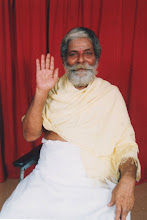Pathanjali Yoga Sutras: Samadhi pada
Sutra 23: 'Ishvara pranidhanaadva'
Concentration may also be attained through devotion to Ishwara.
Sutra 24: 'Klesha karma vipaakaashayai paramrushtah purushavishesha Ishwarah'
Ishwara is a special kind of Being, untouched by ignorance and the products of ignorance, not subject to karmas or samskaras or the result of action.
Explanation:
Here for the first time, Pathanjali introduces the idea of God. According to Vedanta philosophy Ishwara is the supreme Ruler of the universe - its Creator, Sustainer and Dissolver. Brahman, the ultimate Reality, cannot properly be said to create, sustain or dissolve, since Brahman is, by definition, without attributes. Ishwara is Brahman seen within Prakruti.
What is important is the concept of devotion. Liberation as we have already seen in previous two sutras, can be reached without devotion to God. But this is a subtle and dangerous path, threading its way through the pitfalls of ambition and pride. Devotion to a personal ideal of God brings with it a natural inclination to humility and service. It sweetens the dryness of intellectual discrimination and calls forth the highest kind of love of which man is capable. We cannot even imagine Brahman until the moment of our liberation, but we can all imagine Ishwara, according to our different natures -- for Ishwara has attributes which our minds can recognize. Ishwara is all that we can know of the Reality until we pass beyond Prakruti.
If we set ourselves to serve Ishwara, if we dedicate our actions and surrender our wills to Him, we shall find that He draws us to Himself. This is the grace of God, which Sri Ramakrishna compared to an ever-blowing breeze; you have only to raise your sail in order to catch it. And in the Gita, we read:
"Whatever your action, food or worship;
Whatever the gift that you give to another;
Whatever you vow to the work of the spirit;
Lay these also as offerings before me."
This kind of devotion requires, perhaps, a special temperament. It is to be able to feel it is great blessing, for it is the safest and happiest way to liberation. Ishwara, it has been said, is God as He appears within Prakruti. But it must be remembered that Ishwara is Prakruti's ruler, not its servant.That is why Pathanjali describes Him as "a special kind of Being". A man is the servant of Prakruti. He is subject to ignorance of his real Self (the Atman) and to products of this ignorance -- egotism, attachment to sense-objects, aversion from them (which is merely attachment in reverse) and a blind clinging to his present life: the various forms of bondage which constitute misery. Ishwara is not subject to ehis ignorance, or to its products.
Man is subject to the laws of birth and death, the laws of karma. Ishwara is unborn, undying. Man is subject to his samskaras -- the deeply rooted tendencies which drive him or to further actions and desires. Ishwara is free from samskaras and desires. He is not involved in the results of action.
Man, it is true, may become liberated. But even in this he differs from Ishwara -- for Ishwara was never in bondage. After liberation , man is one with Brahman, But he can never become one with Ishwara (Indeed the desire to become Ishwara, the Ruler of universe, would be the most insane of all egotistical desires). In the state of union with Brahman, both Ishwara and His universe are transcended, since both are merely projections of Brahman.

No comments:
Post a Comment